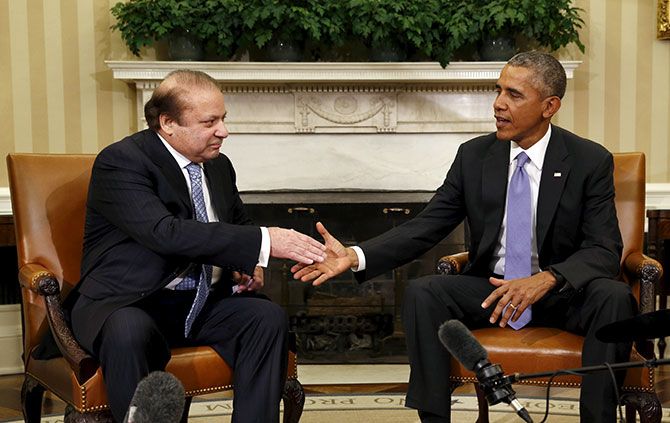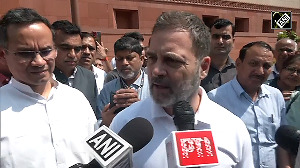'There is the perennial worry in the Indian mind regarding the US 'hyphenating' India and Pakistan.
Frankly, this is a completely nonsensical hypothesis. The US has always 'hyphenated' India and Pakistan and it couldn't have been otherwise,' says Ambassador M K Bhadrakumar.

'If the US has largely managed to do the balancing act, it is largely because there is an uncanny similarity in the DNA of the Pakistani and Indian elites. Both elites seek defining partnerships with Washington,' says Ambassador Bhadrakumar.
What an erstwhile American diplomat and South Asia hand Robin Raphel once said still holds true -- it takes no time at all to raise dust in New Delhi. Indians are a prickly lot.
Why else should we get excited that rumours have appeared in Washington that there might be a reorganisation of work in the US State Department and the office of the Special Representative for Afghanistan and Pakistan (SRAP) could revert to the Bureau of South and Central Asia (BSCA)?
Foreign offices the world over reorganise their departmental work in tune with requirements of policies or sheer efficiency. South Block had a Pakistan Division once, which later became AP Division (Afghanistan-Pakistan), still later Pak-Iraf Division and down the line the IPA Division (Iran-Pakistan-Afghanistan).
It is currently known as PIA (Pakistan-Iran-Afghanistan) Division. Did the whimsical changes mean radical shifts in Indian policies towards those three countries?
Why should it concern us if US Ssecretary of State John Kerry wants the SRAP to merge with the BSCA?
Actually, it seems an act of downgrading the SRAP and could be a prelude to its winding up. The SRAP has been downgraded anyway since its halcyon days when the late Richard Holbrooke held the job. It stands much diminished today, and the new quadrilateral mechanism (comprising Afghanistan, Pakistan, US and China) may replace it.
The top priorities of Washington's India policies have been on extracting better access to the Indian market for US business and boosting American exports (civilian and military), co-opting India into the US' 'pivot' strategy in Asia, and promoting India-Pakistan normalisation (which helps the US' regional strategy.)
These priorities are for the long-term and will not change with the merger of the SRAP with the South and Central Asia bureau.
When the SRAP was created, Washington wanted to mandate Holbrooke to work on conflict resolution on the broader Afghan-Pakistani-Indian canvas. But India suspected, rightly so.
It would have been a matter of time before a hyperactive diplomat like Holbrooke wandered into the Kashmir Valley and created headaches.
Washington understood the Indian sensitivities and limited Holbrooke's mandate to the AfPak region. Which was, really speaking, not a difficult thing to do because Holbrooke's focused mission at that point in time related to kickstarting a dialogue with the Taliban leading to an Afghan settlement riveted on Afghan-Pakistan entente.
India was peripheral to Holbrook's brief. Besides, he wouldn't risked annoying Pakistan by engaging the Indians.
Clearly, much has changed since then. India is now overtly keen to gatecrash into the Afghan peace process. If the reorganization of the South and Central Asia Bureau will now help India to consort with the SRAP, we should welcome it.
Then there is the perennial worry in the Indian mind regarding the US 'hyphenating' India and Pakistan. Frankly, this is a completely nonsensical hypothesis. The US has always 'hyphenated' India and Pakistan and it couldn't have been otherwise.
The US is a superpower with vast interests globally and it is inconceivable that Washington can work on any bilateral relationship within a water-tight compartment.
The US-Indian partnership, Sino-US ties, New Cold War -- these are not independent templates of global politics. No doubt, each has own raison d'etre, but these templates also overlap in the lone superpower's global strategies.
Second, US diplomacy always works on the basis of linkages. Washington's diplomacy towards Manila or Hanoi takes into account the tensions between these capitals and Beijing.
By inserting itself into the antipathies between Beijing and Hanoi, or between Beijing and Manila, or into the territorial disputes in the South China Sea, the US is able to advance its regional and bilateral interests in the Asia-Pacific in a cost-effective manner.
The India-Pakistan tensions are no different insofar as it is in the US' self-interests to insert itself into the role of an intermediary. The point is, despite India's professed aversion toward US mediation, it never really shut the door on an American role in keeping tensions with Pakistan under check.
Of course, the ultimate hope is that Washington will join hands with India to 'isolate' Pakistan and pile pressure on it.
On the other hand, Washington regards Pakistan as an irreplaceable interlocutor/partner in many areas vital to the geopolitics of the Central Asian, West Asian regions and constantly seeks to strengthen its leverage with Islamabad, especially with the military leadership.
Unsurprisingly, Washington cannot remain indifferent to Pakistan's tensions with India, Pakistani sensitivities over India's perceived 'hegemony' or Islamabad's keenness for US mediation.
It becomes a challenge to Washington to maintain balanced relationships with India and Pakistan that would upset neither or create misgivings.
However, if the US has largely managed to do the balancing act, it is largely because there is an uncanny similarity in the DNA of the Pakistani and Indian elites. Both elites seek defining partnerships with Washington.
Suffice it to say, the angst that the US may 'hyphenate' its ties with New Delhi and Rawalpindi is borne out of delusionary thinking that the US is committed to build up India as the pre-eminent regional power and eventually a global power.
It betrays lack of self-confidence, since India's destiny is ultimately its own for the making.
Ambassador M K Bhadrakumar is one of the world's leading experts on Afghanistan.











 © 2025
© 2025